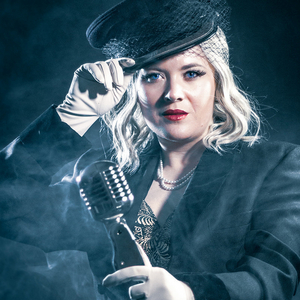 Reviewed by Ewart Shaw, Thursday 11th March 2021.
Reviewed by Ewart Shaw, Thursday 11th March 2021.
The Nazis are big box office, seventy-five years after the end of the Second World War.
Robyn Nevin's A German Life, Tippett's A Child of Our Time, and this Cabaret-inspired inspired cabaret,
The Reichstag is Burning. There is smoke, there is fire, there are back-projections, bomb-blasts, and strobes. If God had employed Tom Kitney as technical director, Creation would have taken five days, not six, and they both could have put their feet up for a weekend.
Joanne Hartstone, introduced by her conférencier, strides out into the stage. She is Iris London, and this is her show. She is a siren, an air raid warning siren, strong, athletic, marching into war. While, obviously, we are drawn back to the late twenties and thirties in Berlin, her song choices are eclectic, her new words well-chosen to emphasise her themes. The perfect example is her version of
I'd Sell My Soul for Total Control. I didn't know about the Motels, though I knew the song.
Pretty Fly for a Weiss Guy? Heard the song, now I know who wrote it.
Iris is called a Cabaret Cassandra. She was a Trojan priestess cursed by Apollo to always tell the grim truth and never to be believed. Now we know what happened in Germany in the twenties and thirties, and what it led to. She delivers her message with, well, can I call it German precision?
I have always loved the songs of Berlin, sexy subversive sensual. She includes the Lilac song and a full-on performance of
Kick All the Men Out of the Reichstag, with a lot of athletic kicking to emphasise the point. There's one song from the other Berlin, Irving,
When That Man Is Dead And Gone. Find it on YouTube. It's great.
If she has one limitation, it's that she can't do sleaze. What she can do though is twist your heart. At the end of the show you see Iris London, in a raincoat in the snow, a casualty of the war on cabaret. The song is authentic
Reich Mir Zum Abschied Noch Einmal Die Hand (
Give Me Your Hand One Last Time), by Paul Abraham, with lyrics by
Alfred Grunwald and
Fritz Lohner-Beda, translated by Michael Morley.
Emma Knights is the musical director, and two other Hartstones, father and brother, are also credited. The accompaniments are excellent and blended carefully into the soundtrack of the show. The influence of Herr Professor Doktor Michael Morley, of Flinders University, cannot be overlooked; teacher, translator, pianist and, here, as the voice of the conférencier. He has carried the torch high and brightly for a very long time and has shone that light on many performers in Adelaide and elsewhere.
I miss those Weimar days, not the republic so much as the Weimar Room, that grubby but inviting Hindley Street venue of wine-soaked memory, nursery of great careers. Ah, Hans, you were a shy boy hiding behind your accordion, and look at you now. Of course, Hartstone's not out to bring you those songs, but to remind us all of serious things. Music and cabaret can be vibrant in opposition to authority, and equally vulnerable. Democracy is fragile. Germany was once a great nation of philosophers and musicians, but also of a great number of people easily swayed by demagoguery and a poisonous cocktail of economic collapse and racism.
While the internet has allowed mad people to spread their bile across our ideals, it's given us all a chance to speak up and be heard. Let's hear it for the amazing political commentators and humorists. Let's praise the free press. A maddened mob attacks the Capitol and, within days, their 'selfies' have incriminated them, and the law sweeps them up like rubbish. Their Führer abandons them. Let's hear it for Hartstone and Kitney, pulling magical things out of a black box.
Reader Reviews
To post a comment, you must
register and
login.
 Reviewed by Ewart Shaw, Thursday 11th March 2021.
Reviewed by Ewart Shaw, Thursday 11th March 2021.
